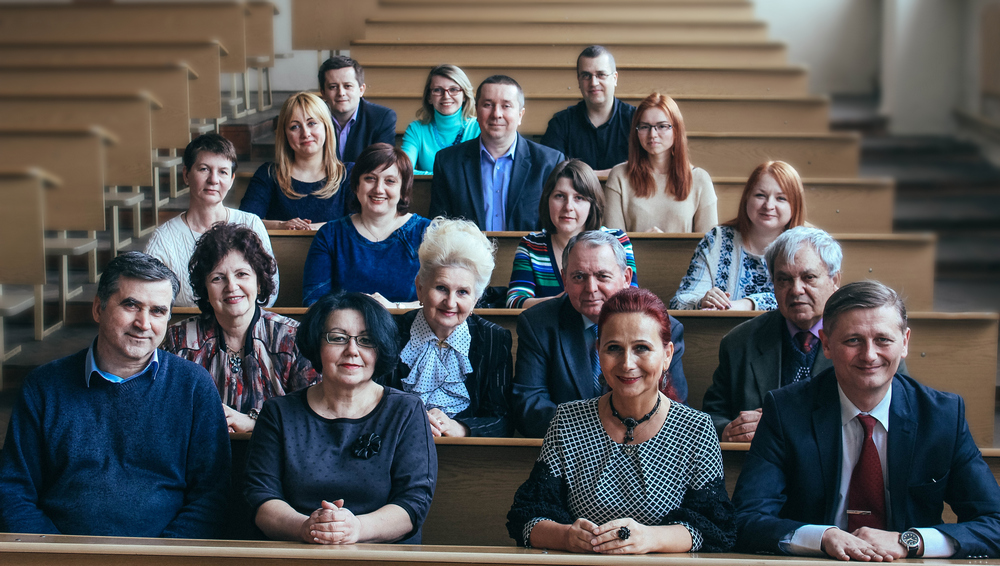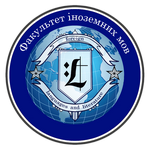History of the Department:
The department began its journey on June 25, 1976. On this date, Decree No. 117 of the Ministry of Education of the Ukrainian SSR was issued, establishing the Department of German Language at the then Ivano-Frankivsk State Pedagogical Institute. According to this decree, another decree No. 154 was issued on July 7, 1976, which organized the Department of German Language under the Faculty of Foreign Languages starting September 1 of the same year.
Following a competitive selection, and according to Decree No. 194-K, the first head of the department was appointed on September 1 of the same year: Candidate of Philological Sciences, Senior Lecturer S.P. Handziuk, who held this position until 1987.
 The first faculty members were: Candidate of Philology, Head of the Department S.P. Handziuk , Candidate of Philology, Associate Professor Y.A. Baran , Candidate of Philology, Associate Professor N.I. Dychkivska ,Senior Lecturer V.I. Pavliuk , Assistant I.I. Hryvnak .
The first faculty members were: Candidate of Philology, Head of the Department S.P. Handziuk , Candidate of Philology, Associate Professor Y.A. Baran , Candidate of Philology, Associate Professor N.I. Dychkivska ,Senior Lecturer V.I. Pavliuk , Assistant I.I. Hryvnak .
These educators were responsible for the German language instruction as a second foreign language for the specialty “English Language and Literature”.
 With the gradual increase in student enrollment at the Faculty of Foreign Languages and the introduction of combined specialties at the Faculty of Philology related to the German language (“Ukrainian Language and Literature, German Language”, “Russian Language and Literature, German Language”), the department also saw a gradual increase in its staff. New faculty members included V.V. Lazarovych (Candidate of Philology, Associate Professor), N.I. Lesiv (Assistant), Y.T. Bylytsia (Candidate of Philology, Associate Professor), Y.V. Zubiak (Senior Lecturer), V.M. Turchyn (Candidate of Philology, Associate Professor), and L.V. Androshchuk (Senior Lecturer). From 1987 to 1990, the department was headed by Candidate of Philology, Associate Professor N.I. Hrytsyna. During this period, new lecturers joined: H.M. Pakholok and V.V. Tkachivskyi (both now Candidates of Philological Sciences, Associate Professors), B.M. Marunevych and O.I. Vlasova (both Candidates of Pedagogy, Associate Professors), H.M. Shatska and I.Ya. Malashevska. An important event during this period was the establishment of the specialty “German Language and Literature” in 1989. Accordingly, the Department of German Language was renamed the Department of German Philology.
With the gradual increase in student enrollment at the Faculty of Foreign Languages and the introduction of combined specialties at the Faculty of Philology related to the German language (“Ukrainian Language and Literature, German Language”, “Russian Language and Literature, German Language”), the department also saw a gradual increase in its staff. New faculty members included V.V. Lazarovych (Candidate of Philology, Associate Professor), N.I. Lesiv (Assistant), Y.T. Bylytsia (Candidate of Philology, Associate Professor), Y.V. Zubiak (Senior Lecturer), V.M. Turchyn (Candidate of Philology, Associate Professor), and L.V. Androshchuk (Senior Lecturer). From 1987 to 1990, the department was headed by Candidate of Philology, Associate Professor N.I. Hrytsyna. During this period, new lecturers joined: H.M. Pakholok and V.V. Tkachivskyi (both now Candidates of Philological Sciences, Associate Professors), B.M. Marunevych and O.I. Vlasova (both Candidates of Pedagogy, Associate Professors), H.M. Shatska and I.Ya. Malashevska. An important event during this period was the establishment of the specialty “German Language and Literature” in 1989. Accordingly, the Department of German Language was renamed the Department of German Philology.
 From November 1990, the department was headed by Candidate of Philology, Associate Professor Y.T. Bylytsia. In the early 1990s, new lecturers joined: Senior Lecturer B.M. Lapinskyi, M.M. Turchyn, M.R. Tkachivska, V.M. Uhryniuk, O.Ya. Ostapovych (Candidates of Philology, Associate Professors).
From November 1990, the department was headed by Candidate of Philology, Associate Professor Y.T. Bylytsia. In the early 1990s, new lecturers joined: Senior Lecturer B.M. Lapinskyi, M.M. Turchyn, M.R. Tkachivska, V.M. Uhryniuk, O.Ya. Ostapovych (Candidates of Philology, Associate Professors).

Starting in 2000, the department was joined by young lecturers, primarily its graduates, including Candidates of Philology, Associate Professors, and Assistants: A.A. Vengrynovych, R.V. Uhryniuk, V.V. Turchyn, S.I. Lypka, Yu.M. Kapak, N.O. Korolova.
On October 11, 2009, the position of department head was taken by Candidate of Philology, Associate Professor, and 1994 department graduate O.Ya. Ostapovych. In December 2016, the University Academic Council re-elected him as department head for a second five-year term.
Part-time, the department employed Professor of Chernivtsi National University named after Yuriy Fedkovych, Doctor of Philology Oleksandr Dmytrovych Ohui. The presence of a sufficient number of highly qualified lecturers allowed the Ministry of Education of Ukraine to recognize and establish the Department of German Language as a suport department among similar departments in Ukraine from 1985 to 1990, and from 1992 to 1997, it served as a base department for conducting the All-Ukrainian Student Olympiads in the German language. Since the early 1990s, the department established close contacts with various institutions in German-speaking countries, mainly in Germany and Austria, including the Goethe Institute (Munich), the Institute of German Studies (Munich), the Ukrainian Free University (Munich), the University of Vienna (Austria), the German Academic Exchange Service (DAAD), and the Bavarian Red Cross, especially its district offices in Dachau and Augsburg. These contacts enabled almost all department lecturers to undergo scientific internships in German-speaking countries, significantly strengthen the department’s material base, and establish a substantial library fund.

March, 2018
